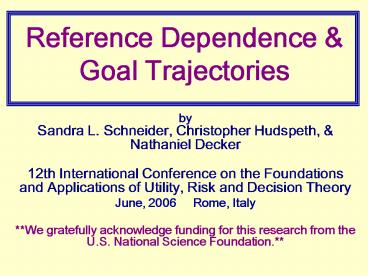Reference Dependence PowerPoint PPT Presentation
1 / 38
Title: Reference Dependence
1
Reference Dependence Goal Trajectories
- by
- Sandra L. Schneider, Christopher Hudspeth,
Nathaniel Decker - 12th International Conference on the Foundations
and Applications of Utility, Risk and Decision
Theory - June, 2006 Rome, Italy
- We gratefully acknowledge funding for this
research from the U.S. National Science
Foundation.
2
Controlling Risk Choice vs. Change
- Choice
- Assumes simultaneous presentation of two or more
possible future states - Control through selection of given option
- Change
- Assumes self-initiated action focused on possible
future states - Control through intervention aimed at altering
current state
3
Risky Choice Which Option Do I Take?
4
Goal Trajectories Where Do I Go from Here?
5
Evidence of the Impact of Goal Trajectories
- McKenzie Nelson assumptions re glass
half-full vs. half-empty - Kahneman Miller Simonson Mellers Schwartz
etc. expectation and contrast effects - Higgins Lopes Wang etc. motivational focus
- Damasio Slovic, Peters Svenson Isen
neurological affective/motivational systems - Schneider colleagues temporal context,
responsibility, affective reactions
6
Goal Trajectories ChangeThe Ticket Transfer
Paradigm
7
Goal Trajectories ChangeThe Ticket Transfer
Paradigm
8
Managing Risk Through Change
9
Managing Risk Through Change
10
Managing Risk Through Change
11
Managing Risk Through Change
12
Managing Risk Through Change
13
Managing Risk Through Change
14
Study 1a Changing Risk
- Participants
- 148 psychology undergraduates (79 F)
- 109 passed lottery comprehension quiz (78 F)
- Stimuli
- 18 2-ticket lotteries
- All neg, neg0, mixed, pos0, all pos
- Dependent Variable
- who move higher versus lower ticket
15
Risk Seeking for Losses
Risk Averse for Gains
Loss Aversion
16
17
18
19
For Attempts to Change Risk
- Losses
- The majority are risk averse and focus on
avoiding the largest loss. - Mixed
- The majority are risk averse and focus on
guaranteeing no loss. - Gains
- Less clear pattern
20
From Change to Choice
21
Study 1b Choice Analogs
- Participants
- 177 psychology undergraduates (84 F)
- 152 passed lottery comprehension quiz
- Stimuli
- 18 Pairs of two-outcome lotteries derived from
previous Ticket Transfer Task - DV
- choice of option representing higher or lower
move
22
From Change
23
. to Choice
24
Choice
Change
25
Study 2 Replication Extension
26
Underlying Difference?
- Choice High Move (Risk Seeking)
- ? I would rather take a chance on losing less
money. - Im not entering into a loss situation
without having some chance that I can come away
with a small loss. - Change Low Move (Risk Averse)
- ? If I have to lose money, I want to be sure it
is the least amount possible. - I am already facing a loss situation, so I
need to protect myself from a large loss.
27
Study 3 Health Preferences
- Participants
- Change 77 of 95 passed quiz (85 F)
- Choice 66 of 84 passed quiz (84 F)
- Stimuli
- 54 two-ticket lotteries from
- Death (-500 health units) to
- Perfect Health (500 health units)
- All neg, neg0, mixed, pos0, all pos
- Dependent Variable
- who move or choose higher vs. lower ticket
28
Health Change
29
Health Change
30
Health Choice
31
(No Transcript)
32
Risk Preferences
- Risk Seeking for Losses may be unique to choice
(esp. money). - Risk Aversion for Losses may be ubiquitous for
change. - Risk Aversion for Gains is especially strong near
0 (and may only be reliable there) . - Preferences are more risk averse for health than
money.
33
Underlying Difference?Not Psychophysics
- Prospect Theory
- Decreasing Sensitivity NO
- Decision weights NO
- Loss Aversion yes no
- Reference Dependence YESbut why?
34
Underlying Difference?Motivational Processes
- Goal Trajectories remind subjects not only of
current reference point but also future goal
state. - Encourages consideration of both immediate and
longer term goals. - Simple choice lotteries may take people out of a
more natural daily context.
35
- Focus on Goals
- Experiences Cumulative Outcomes
- Framing effects reduced as all move to more
risk averse preference patterns - Affective differences
- Positive Frame relatively more pleased,
excited, confident, comfortable, and enthusiastic - Negative Frame relatively more upset,
disappointed, and frustrated
36
- Risk Strategies
- Simulations of Outcomes Across Time
- For focus on choice only risk seeking vs
risk averse moves alters potential outcomes - For focus on goals can influence potential
outcomes differentially to improve chances of
achieving goals
37
Goal Trajectories Critical Explanatory Construct
Reference Dependence arises out of the
fundamental nature of goal-directed
actions. Decisions are driven by sensitivity to
better and worsemust have referent. What
about rationality Consistency and
coherence--of goal trajectory?
38
Goal-Directed Adaptive Organisms
- Cognitive Science dynamic(al) systems
- Neuroscience somatic marker BIS/BAS
- Artificial Intelligence embodied cognition
- Systems Engineering feedback loops
- Education situated nature of knowledge
- Vision Science affordances coupling
- Cognitive Psychology contextualism

